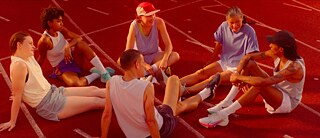Review: Life is Not a Competition but I'm Winning (2022)
by Princess Kinoc of Film Police Reviews
What’s interesting to me about Julia Fuhr Mann’s Life is Not A Competition… But I Am Winning is its inventive aspect of mixing interviews, footage, and narration by different members of marginalized communities, whether they be women or those from the LGBTQIA++ community.
Accepting that “history is written by the victors,” Mann goes all out with an agenda: to showcase a side of the Olympics that is more than the celebrity torchbearers, and to highlight the grim history of why minorities have constantly faced numerous restrictions and rejections simply because they are not white males.
Oftentimes distracting is the way the camera pans in and out like it’s a Nike commercial, but I guess, if we are going towards that pun, then the way the camera goes in and out is perhaps just apt to the subject of this documentary: the unfair world of sports.
Julia Fuhr Mann is a queer director, whose Riot Not Diet (2018) experimental short desensitizes what it means to be queer, fat, and a feminist. It is exciting and shows promise, one that led her to make this documentary film feel similar. The way she equips real-life trans athletes and women to tell their stories that are often only heard of in their locker rooms, or even in the comfort of friends and loved ones, shows how much of an empathic person she is, which is important in making films.
The result is both a picturesque look at how we minorities have survived through the years, and yet the endless patriarchy still tries to ruin it for us. There is a particular scene here that reminded me of an interview with our very own Nesthy Petecio, a female boxer set to compete in the Paris Olympics 2024 (Nesthy herself won silver at the 2020 Summer Olympics). The way that both the archival footage of the 1928 Olympics that allowed women to compete, despite years of declining us from joining as we were then branded as “the weaker sex,” and the way that a similar story from a trans athlete who said that women’s bodies are the most misunderstood in sports.
When we women get our periods, as excruciating as it may be, it is wrong to conclude that there is an emotional shift that occurs within us, and the same is often misunderstood when women compete in sports. Often, our bodies change due to rigorous training, but it does not limit our capabilities to compete. And it shouldn’t. The way that trans athletes are often discriminated against for competing with their chosen gender is also something that I had never heard of until this.
And despite the many trivial stories that come out of this film, Mann and her gang of narrators offer love and support to both the past and future athletes who might be an audience sitting somewhere in the cinema. The rich tapestry of stories all come together with one hope that if only everyone is given a fair share at the table, then perhaps there is no need for hate, but only love and acceptance. And a chance at performing at their best.

